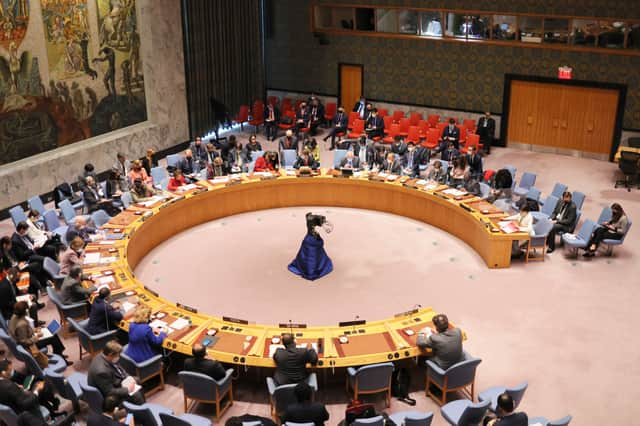What is the UN Security Council? Permanent members explained, what does it do, and can Russia be expelled


The UN Security Council has repeatedly met over the past few weeks as Russia continues to assault Ukraine in its attempted invasion.
While a vote within the larger UN group showed overwhelming support for Ukraine in the conflict, Russia has also tried to use the security council to its advantage, calling an emergency meeting to raise issues over chemical weapons.
But what power does the groups hold, and which are members?
Advertisement
Hide AdAdvertisement
Hide AdHere’s everything you need to know about the UN Security Council.
What is the UN Security Council?
The United Nations (UN) Security Council is a faction of the UNited Nations which “has primary responsibility for the maintenance of international peace and security”.
It was created on 24 October 1945, in the aftermath of World War Two.
It has had a prominent role in past conflicts, including the Korean War and the fall of the Soviet Union, including also authorising peacekeeping operation in locations such as Bosnia & Herzegovina, Kuwait and Somalia.
Advertisement
Hide AdAdvertisement
Hide AdIt is made up of fifteen members, including five permanent members.
Which countries are a member of the UN Security Council?
The five permanent members of the UN Security Council are:
- China
- United States
- France
- Russia
- UK and Northern Ireland
These permanent members hold the power to veto any resolution brought to the council, however they cannot end debates around them.
China, the US, France, Russia and the UK and Northern Ireland have all been members since the induction of the council.
Non-permanent members are voted in on a continual basis.
Each non-permanent state hold their place on the council for two-years.
Current non-permanent members include:
- Albania
- Brazil
- Gabon
- Ghana
- India
- Ireland
- Kenya
- Mexico
- Norway
- United Arab Emirates
Ukraine was last a member in 2016 and 2017.
Can Russia be removed as a permanent member?
Advertisement
Hide AdAdvertisement
Hide AdRussia’s recent moves have led many to question its place on the council.
Most recently, Russia called an emergency meeting on 11 March to tell member countries that they believed that Ukraine was creating chemical weapons during the invasion.
Vasily Nebenzya, the Russian ambassador to the council, produced no evidence of said operations.
The US then shared that it believed that Russia was bringing the topic to the table in order to set a pretext for using such weapons in an attack.
Advertisement
Hide AdAdvertisement
Hide AdThe Security Council also condemned the attack on a Mariupol maternity hospital which killed three people including one child.
Despite the outrage, there is currently no mechanism to remove a permanent member of the security council.
In order to remove a permanent member, they must first be removed from the larger UN General Assembly.
The Security Council would need to make the recommendation to the General Assembly to vote a country out.
Advertisement
Hide AdAdvertisement
Hide AdAs Russia is a permanent member of the Security Council, this will not happen.
Support people fleeing the devastating conflict in Ukraine: donate to the DEC appeal
Disasters Emergency Committee (DEC) charities and their local partners are in Ukraine and in neighbouring countries providing food, water, shelter and medical assistance. Learn more and donate what you can today
A message from the editor:
Thank you for reading. NationalWorld is a new national news brand, produced by a team of journalists, editors, video producers and designers who live and work across the UK. Find out more about who’s who in the team, and our editorial values. We want to start a community among our readers, so please follow us on Facebook, Twitter and Instagram, and keep the conversation going. You can also sign up to our email newsletters and get a curated selection of our best reads to your inbox every day.
Comment Guidelines
National World encourages reader discussion on our stories. User feedback, insights and back-and-forth exchanges add a rich layer of context to reporting. Please review our Community Guidelines before commenting.
